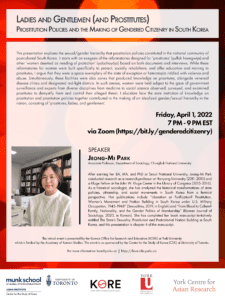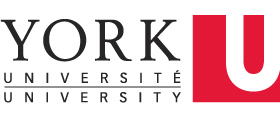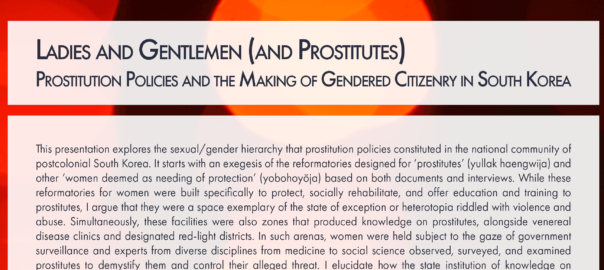Ladies and Gentlemen (and Prostitutes): Prostitution Policies and the Making of Gendered Citizenry in South Korea
April 1, 2022

Event Description
This presentation explores the sexual/gender hierarchy that prostitution policies constituted in the national community of postcolonial South Korea. It starts with an exegesis of the reformatories designed for ‘prostitutes’ (yullak haengwija) and other ‘women deemed as needing of protection’ (yobohoyŏja) based on both documents and interviews. While these reformatories for women were built specifically to protect, socially rehabilitate, and offer education and training to prostitutes, I argue that they were a space exemplary of the state of exception or heterotopia riddled with violence and abuse. Simultaneously, these facilities were also zones that produced knowledge on prostitutes, alongside venereal disease clinics and designated red-light districts. In such arenas, women were held subject to the gaze of government surveillance and experts from diverse disciplines from medicine to social science observed, surveyed, and examined prostitutes to demystify them and control their alleged threat. I elucidate how the state institution of knowledge on prostitution and prostitution policies together contributed to the making of an idealized gender/sexual hierarchy in the nation, consisting of ‘prostitutes, ladies, and gentlemen’.
SPEAKER
JEONG-MI PARK
Associate Professor, Sociology, Chungbuk National University
After earning her BA, MA, and PhD at Seoul National University, Jeong-Mi Park conducted research as a research professor at Hanyang University (2011-2015) and a Kluge Fellow at the John W. Kluge Center in the Library of Congress (2015-2016). As a historical sociologist, she has analyzed the historical transformations of state policies, citizenship, and social movements in South Korea from a feminist perspective. Her publications include “Liberation or Purification? Prostitution, Women’s Movement and Nation Building in South Korea under U.S. Military Occupation, 1945-1948” (Sexualities, 2019, in English) and “From Blood to Culture? Family, Nationality, and the Gender Politics of Membership” (Korean Journal of Sociology, 2020, in Korean). She has completed her book manuscript tentatively entitled The State’s Sexuality: Prostitution and Postcolonial Nation Building in South Korea, and this presentation is chapter 4 of the manuscript.
This virtual event is organized by Laam Hae (Politics, York University)
This virtual event is presented by the Korean Office for Research and Education (KORE), which is funded by the Academy of Korean Studies. This event is co-sponsored by the Centre for the Study of Korea (CSK) at University of Toronto.





